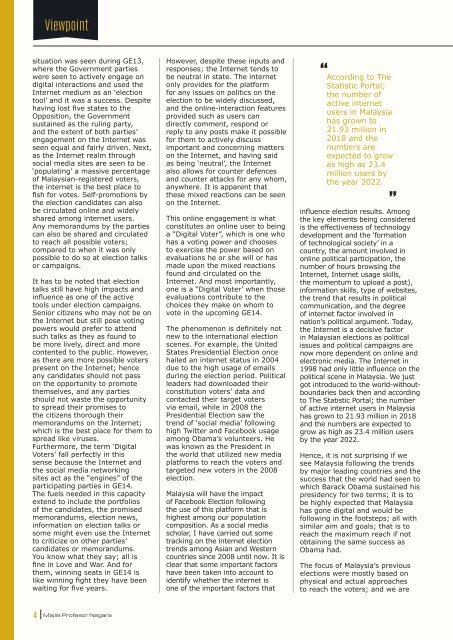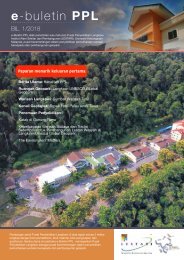Buletin MPN Edisi Khas PRU 14
Edisi Khas Pilihan Raya ke-14 atau PRU14 ini memaparkan analisis dan isu mengenai PRU14 akan datang. Selamat membaca...
Edisi Khas Pilihan Raya ke-14 atau PRU14 ini memaparkan analisis dan isu mengenai PRU14 akan datang. Selamat membaca...
Create successful ePaper yourself
Turn your PDF publications into a flip-book with our unique Google optimized e-Paper software.
Viewpoint<br />
situation was seen during GE13,<br />
where the Government parties<br />
were seen to actively engage on<br />
digital interactions and used the<br />
Internet medium as an ‘election<br />
tool’ and it was a success. Despite<br />
having lost five states to the<br />
Opposition, the Government<br />
sustained as the ruling party,<br />
and the extent of both parties’<br />
engagement on the Internet was<br />
seen equal and fairly driven. Next,<br />
as the Internet realm through<br />
social media sites are seen to be<br />
‘populating’ a massive percentage<br />
of Malaysian-registered voters,<br />
the internet is the best place to<br />
fish for votes. Self-promotions by<br />
the election candidates can also<br />
be circulated online and widely<br />
shared among internet users.<br />
Any memorandums by the parties<br />
can also be shared and circulated<br />
to reach all possible voters;<br />
compared to when it was only<br />
possible to do so at election talks<br />
or campaigns.<br />
It has to be noted that election<br />
talks still have high impacts and<br />
influence as one of the active<br />
tools under election campaigns.<br />
Senior citizens who may not be on<br />
the Internet but still pose voting<br />
powers would prefer to attend<br />
such talks as they as found to<br />
be more lively, direct and more<br />
contented to the public. However,<br />
as there are more possible voters<br />
present on the Internet; hence<br />
any candidates should not pass<br />
on the opportunity to promote<br />
themselves, and any parties<br />
should not waste the opportunity<br />
to spread their promises to<br />
the citizens thorough their<br />
memorandums on the Internet;<br />
which is the best place for them to<br />
spread like viruses.<br />
Furthermore, the term ‘Digital<br />
Voters’ fall perfectly in this<br />
sense because the Internet and<br />
the social media networking<br />
sites act as the “engines” of the<br />
participating parties in GE<strong>14</strong>.<br />
The fuels needed in this capacity<br />
extend to include the portfolios<br />
of the candidates, the promised<br />
memorandums, election news,<br />
information on election talks or<br />
some might even use the Internet<br />
to criticize on other parties’<br />
candidates or memorandums.<br />
You know what they say; all is<br />
fine in Love and War. And for<br />
them, winning seats in GE<strong>14</strong> is<br />
like winning fight they have been<br />
waiting for five years.<br />
However, despite these inputs and<br />
responses; the Internet tends to<br />
be neutral in state. The internet<br />
only provides for the platform<br />
for any issues on politics on the<br />
election to be widely discussed,<br />
and the online-interaction features<br />
provided such as users can<br />
directly comment, respond or<br />
reply to any posts make it possible<br />
for them to actively discuss<br />
important and concerning matters<br />
on the Internet, and having said<br />
as being ‘neutral’, the Internet<br />
also allows for counter defences<br />
and counter attacks for any whom,<br />
anywhere. It is apparent that<br />
these mixed reactions can be seen<br />
on the Internet.<br />
This online engagement is what<br />
constitutes an online user to being<br />
a “Digital Voter”, which is one who<br />
has a voting power and chooses<br />
to exercise the power based on<br />
evaluations he or she will or has<br />
made upon the mixed reactions<br />
found and circulated on the<br />
Internet. And most importantly,<br />
one is a “Digital Voter’ when those<br />
evaluations contribute to the<br />
choices they make on whom to<br />
vote in the upcoming GE<strong>14</strong>.<br />
The phenomenon is definitely not<br />
new to the international election<br />
scenes. For example, the United<br />
States Presidential Election once<br />
hailed an internet status in 2004<br />
due to the high usage of emails<br />
during the election period. Political<br />
leaders had downloaded their<br />
constitution voters’ data and<br />
contacted their target voters<br />
via email, while in 2008 the<br />
Presidential Election saw the<br />
trend of ‘social media’ following<br />
high Twitter and Facebook usage<br />
among Obama’s volunteers. He<br />
was known as the President in<br />
the world that utilized new media<br />
platforms to reach the voters and<br />
targeted new voters in the 2008<br />
election.<br />
Malaysia will have the impact<br />
of Facebook Election following<br />
the use of this platform that is<br />
highest among our population<br />
composition. As a social media<br />
scholar, I have carried out some<br />
tracking on the internet election<br />
trends among Asian and Western<br />
countries since 2008 until now. It is<br />
clear that some important factors<br />
have been taken into account to<br />
identify whether the internet is<br />
one of the important factors that<br />
According to The<br />
Statistic Portal;<br />
the number of<br />
active internet<br />
users in Malaysia<br />
has grown to<br />
21.93 million in<br />
2018 and the<br />
numbers are<br />
expected to grow<br />
as high as 23.4<br />
million users by<br />
the year 2022.<br />
influence election results. Among<br />
the key elements being considered<br />
is the effectiveness of technology<br />
development and the ‘formation<br />
of technological society’ in a<br />
country, the amount involved in<br />
online political participation, the<br />
number of hours browsing the<br />
Internet, Internet usage skills,<br />
the momentum to upload a post),<br />
information skills, type of websites,<br />
the trend that results in political<br />
communication, and the degree<br />
of internet factor involved in<br />
nation’s political argument. Today,<br />
the Internet is a decisive factor<br />
in Malaysian elections as political<br />
issues and political campaigns are<br />
now more dependent on online and<br />
electronic media. The Internet in<br />
1998 had only little influence on the<br />
political scene in Malaysia. We just<br />
got introduced to the world-withoutboundaries<br />
back then and according<br />
to The Statistic Portal; the number<br />
of active internet users in Malaysia<br />
has grown to 21.93 million in 2018<br />
and the numbers are expected to<br />
grow as high as 23.4 million users<br />
by the year 2022.<br />
Hence, it is not surprising if we<br />
see Malaysia following the trends<br />
by major leading countries and the<br />
success that the world had seen to<br />
which Barack Obama sustained his<br />
presidency for two terms; it is to<br />
be highly expected that Malaysia<br />
has gone digital and would be<br />
following in the footsteps; all with<br />
similar aim and goals; that is to<br />
reach the maximum reach if not<br />
obtaining the same success as<br />
Obama had.<br />
The focus of Malaysia’s previous<br />
elections were mostly based on<br />
physical and actual approaches<br />
to reach the voters; and we are<br />
4<br />
Majlis Profesor Negara




